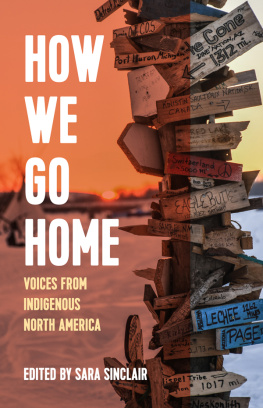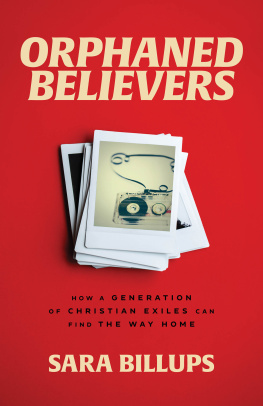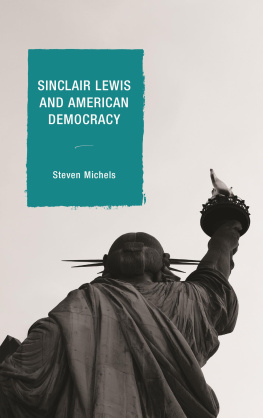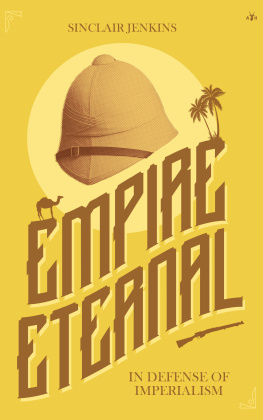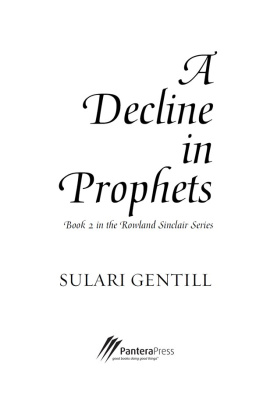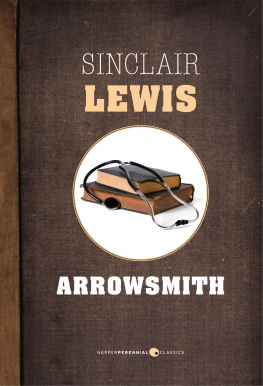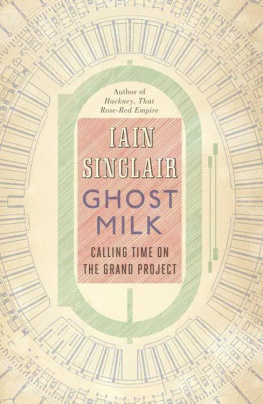Sara Sinclair - How We Go Home
Here you can read online Sara Sinclair - How We Go Home full text of the book (entire story) in english for free. Download pdf and epub, get meaning, cover and reviews about this ebook. publisher: Haymarket Books, genre: Home and family. Description of the work, (preface) as well as reviews are available. Best literature library LitArk.com created for fans of good reading and offers a wide selection of genres:
Romance novel
Science fiction
Adventure
Detective
Science
History
Home and family
Prose
Art
Politics
Computer
Non-fiction
Religion
Business
Children
Humor
Choose a favorite category and find really read worthwhile books. Enjoy immersion in the world of imagination, feel the emotions of the characters or learn something new for yourself, make an fascinating discovery.
- Book:How We Go Home
- Author:
- Publisher:Haymarket Books
- Genre:
- Rating:4 / 5
- Favourites:Add to favourites
- Your mark:
- 80
- 1
- 2
- 3
- 4
- 5
How We Go Home: summary, description and annotation
We offer to read an annotation, description, summary or preface (depends on what the author of the book "How We Go Home" wrote himself). If you haven't found the necessary information about the book — write in the comments, we will try to find it.
How We Go Home — read online for free the complete book (whole text) full work
Below is the text of the book, divided by pages. System saving the place of the last page read, allows you to conveniently read the book "How We Go Home" online for free, without having to search again every time where you left off. Put a bookmark, and you can go to the page where you finished reading at any time.
Font size:
Interval:
Bookmark:
Praise for How We Go Home
This edited collection offers deep, experiential dives into law, policy, and life for contemporary Indigenous peoples in what is now the United States and Canada. These conversations and life histories, taken together, tell us a critical story of the effort it takes to live and transform structures that Indigenous peoples inherit and push against in bids for dignity, sovereignty, care, and justice in the twenty-first century.
Audra Simpson (Kahnaw:ke Mohawk), professor of anthropology, Columbia University
This extraordinary book powerfully conveys both the cruel, ongoing dispossession of the Indigenous peoples of North America and their astounding spiritual wealth and resilience. How We Go Home introduces this complex history organically, through riveting and varied first-person stories skillfully woven into a larger tale. All those who seek to create a more just and sustainable way of living should be grateful for the essential wisdom shared in these oral histories.
Amy Starecheski, director, Columbia University Oral History MA Program
Sara Sinclairs editorial vision in How We Go Home: Voices from Indigenous North America is both radically inclusive and extraordinarily caring. There are so many deep histories here that we need to talk about, that we havent been talking enough about. How We Go Home requires us to genuinely hear and listen to the stories and the histories that have shaped Indigenous lives across North America. All of these stories resonated with me in an intimate and personal wayits at times both comforting and alarming to read about so many diverging life experiences that so often strike parallels with my own. How We Go Home: Voices from Indigenous North America is an astounding achievement and a deeply necessary book that creates space for a multiplicity of Indigenous lived experiences.
Jordan Abel, author of Nishga
How We Go Home is a testament to modern-day Indigenous revitalization, often in the face of the direst of circumstances. Told as firsthand accounts on the frontlines of resistance and resurgence, these life stories inspire and remind that Indigenous life is all about building a community through the gifts we offer and the stories we tell.
Niigaan Sinclair, associate professor, Department of Native Studies at the University of Manitoba and columnist, Winnipeg Free Press
The voices of How We Go Home are singing a chorus of love and belonging alongside the heat of resistance, and the sound of Indigenous life joyfully dances off these pages.
Leanne Betasamosake Simpson, author of As We Have Always Done
This book will inspire you, itll piss you off; itll take you on a journey of ugly things and beautiful things and back again. Its a hell of a read. Keep this one on your shelf and never let it go. Damn right.
Simon Moya-Smith (Oglala Lakota and Chicano), writer, NBC News THINK
How We Go Home confirms that we all have stories. These stories teach us history, morality, identity, connection, empathy, understanding, and self-awareness. We hear the stories of our ancestors and they tell us who we are. We hear the stories of our heroes and they tell us what we can be.
Honourable Senator Murray Sinclair
In this continent, oral history began with the creation and retelling of the rich, multilayered, and historical origin stories of Indigenous people whose lives were intricately bound to the land. The destruction and stealing of that land, and the systematic and highly personalized violence targeted against so many Indigenous communities, threatened the very act of storytelling itself. This book took my breath away, and then restored it. It refuses silence. It restores the wordand the field of oral history in unleashing the story of our origins.
Mary Marshall Clark, director, Columbia Center for Oral History
Heartfelt, stunning oratory and painfully revealing, Sinclair has gathered together a collection whose stories inform our history. A must-read.
Lee Maracle, Sto:lo poet, novelist, storyteller, and activist
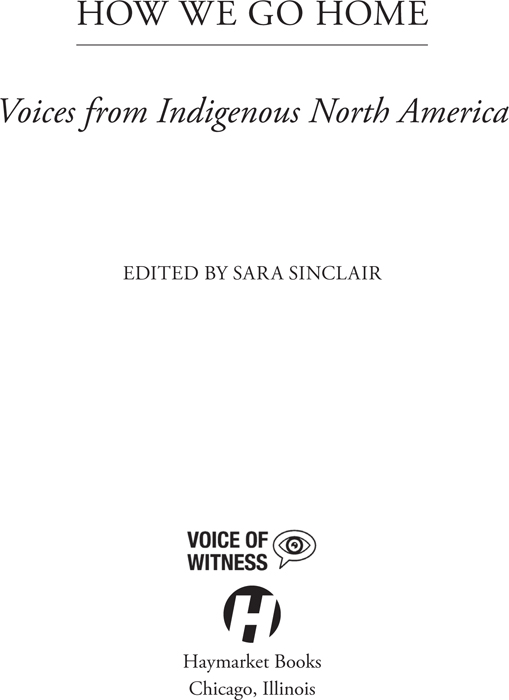
2020 Voice of Witness
Published in 2020 by
Haymarket Books
P.O. Box 180165
Chicago, IL 60618
773-583-7884
www.haymarketbooks.org
ISBN: 978-1-64259-390-7
Distributed to the trade in the US through Consortium Book Sales and Distribution (www.cbsd.com) and internationally through Ingram Publisher Services International (www.ingramcontent.com).
This book was published with the generous support of Lannan Foundation and Wallace Action Fund.
Special discounts are available for bulk purchases by organizations and institutions. Please call 773-583-7884 or email for more information.
Illustrations by Greg Ballenger.
Cover design by Michel Vrana. Cover image Ryan Vizzions shows a signpost pointing to home, erected in fall 2016 by those who came to camp at Standing Rock.
Library of Congress Cataloging-in-Publication data is available.

Transcribers
Maryam Bledsoe, Charles Bowles, Rachel Carle, Julie Chintz, Basil Fraysse, Chris Hart, Molly Hawkins, Kaye Herranen, Mary Kearney-Brown, Ari Kim, Isabelle Lyndon, Josh Manson, Brenna Miller, Margaret OHare, Teresa Pangallozzi, Phillip Reid, Mai Serhan, Barbara Sheffels, Madison Wright, Marcella Villaa
Contextual Essay Research and Writing
Rozanne Gooding Silverwood
Additional Research
Carmen Bolt, Eliana Rose Swerdlow, Lael Tate
Curriculum Specialist
Suzanne Methot
Fact-Checking
Reading List Editorial, readinglisteditorial.com
Copyeditor
Brian Baughan
EDITORS NOTE
In the beginning of each narrative you will find key details about the interviews and the narrators, including the designations they prefer as Indigenous community members. Self-identity for an Indigenous person is a very personal choice: some narrators use their tribe names, others their nations or bands, and these are sometimes used interchangeably. In some cases, we use more than one entity.
INTRODUCTION
Stories of Return
When I was sixteen years old, I took what was essentially my first trip to Indian Country. I rode the train north across Ontario and on to Winnipeg. Crowds shuffled in and out at stops in small towns along the way. With each stop, more and more blue-and green-eyed passengers departed until almost all eyes remaining were dark brown. Skin became darker too. I looked around at the other Native passengers for signs of recognition. I remember thinking that they saw in my eyes what few people in Toronto ever didthat I was one of them.
Throughout much of North America, Indigenous peoples are so rarely considered, our existence so rarely remembered, that, outside Native circles, someone who looks like me is more likely assumed to be Latinx, or part Asian, or of some other not-immediately-identifiable heritage. This is true in Toronto where I grew up and in New York City where I currently live. But it is different in the prairies, and other places throughout the continent, where the mainstream population is aware that they live among Native people because we make up a larger proportion of residents there.
I realized this for the first time that day as my parents, sisters, and I headed west, on our way to a Sinclair family reunion. My paternal grandpa Elmer and five of his six surviving brothers and sisters were gathering on the grassy banks of Manitobas Red River for a party. The day of the reunion was clear and sunny, and on a quiet walk with my grandpa, we visited the graves of his parents and ancestors, ending at the monumental grave of Chief Peguis. Peguis was a Saulteaux chief who arrived in what is now southern Manitoba in the early 1790s. When settlers first arrived at Red River in 1812, Peguis protected them and showed them how to subsist there, providing assistance on numerous occasions when they lacked either food or shelter. Peguis became famous for the care he provided, though he later became disillusioned by the settlers trespasses on his reserve and other violations of the 1817 treaty he signed with Lord Selkirk.
Next pageFont size:
Interval:
Bookmark:
Similar books «How We Go Home»
Look at similar books to How We Go Home. We have selected literature similar in name and meaning in the hope of providing readers with more options to find new, interesting, not yet read works.
Discussion, reviews of the book How We Go Home and just readers' own opinions. Leave your comments, write what you think about the work, its meaning or the main characters. Specify what exactly you liked and what you didn't like, and why you think so.

